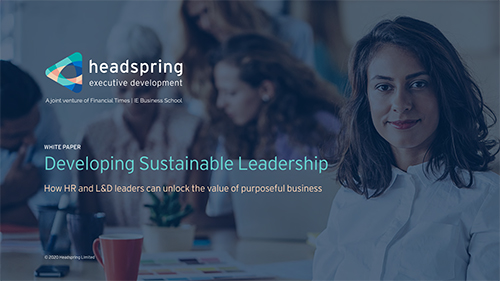New study reveals HR and L&D key to building sustainable leadership
The impact of the Covid-19 crisis is rippling through global communities, acting as an accelerator for social and economic change and bringing into sharp relief the tensions between business and society that were already hotly debated in boardrooms the world over.
At its core, the coronavirus pandemic has been about people, fostering the public sense of a shared human experience. For businesses, this has translated into a shift of focus from the shareholder to the stakeholder as consumers have looked for greater accountability and compassionate leadership from their brands.
Is this a change for good? In this climate of heightened scrutiny, could consensus finally cohere around a more socially conscious approach to business that creates greater benefits for all?
Most importantly, how can HR and L&D leaders ensure that their organisations are equipped with the right competencies to thrive in an economy that prizes purpose and profit?
The best laid plans
At the beginning of 2020, Headspring commissioned research into the adoption of environmental, social and governance (ESG) policies within large corporations in Europe and the Middle East. We collated responses from over 350 senior HR and L&D executives to gain insights into how organisations were preparing for sustainable leadership.
The results are illuminating. Our study shows that sustainability has progressed from being the personal mission of a handful of forward-thinking leaders to becoming a widely accepted priority for all the businesses surveyed.
As we began to distil the findings from the study into a white paper that examined the broader implications for HR and L&D leaders, the coronavirus pandemic swept across continents, effectively shuttering the economies of entire nations, and posing an existential threat to millions of businesses.
The goalposts had moved and – with it – the scope of our report. ESG objectives would have to be reconsidered in the light of the health crisis, as would the HR and L&D strategies needed to adopt them.
The pandemic clearly had implications for our research findings, but to what extent? Will a depressed global economy present a barrier to the implementation of more responsible practices or will it, instead, be a catalyst for innovation?
Simply put: in a post-Covid world, just how sustainable is sustainable business?

ESG is moving up the corporate agenda
Our research shows that HR and L&D leaders recognise the importance of ESG in transitioning businesses through industry and sector changes, as well as from a reputational perspective. Responses returned a degree of national variation in how highly sustainable practices are prioritised – as well as in how (and how effectively) ESG policies are implemented – but the momentum is clearly there.
It’s not plain sailing. The study cautions leaders against the introduction of policies that lack substance. In fact, the perceived vagueness over its wider purpose is thought to present one of ESG’s biggest challenges, being closely linked with low levels of employee engagement.
This response echoes similar concerns over the lack of consensus on how to measure the impact of ESG initiatives: half of the respondents saw this as an obstacle to effective implementation.
The multiple-stakeholder model is continuing to gain ground, challenging the long-held creed of shareholder primacy. However, it’s clear that this ideological paradigm shift will require organisations and their leaders to take a more comprehensive approach to corporate responsibility.
A recent poll of US customers’ reactions to the Covid-19 crisis supports these findings. Consumers’ expectations of corporate responsibility are building.
More than 80 percent of respondents to a survey by not-for-profit research organisation Just Capital said they would remember which companies ‘did the right thing by their workers’ in their efforts to introduce additional workplace safety measures or avoid layoffs. Three-quarters also indicated that they wouldn’t forget those businesses that took missteps ‘long after’ the end of the crisis.
Notably, almost nine in ten of those polled agreed that the pandemic presented a once-in-a-lifetime opportunity for big companies to ‘hit reset’ and prioritise stakeholders.
The Just Capital study also showed that workers who believed their employer was communicating its approach to the Covid-19 crisis clearly and openly were more likely to feel their well-being was valued and that their organisation was on the right track.
These results mirror the outcomes of Headspring’s research, with honest and open communications emerging as critical to a more brand-aligned workforce .
The six guiding principles
It’s impossible to predict with any degree of certainty which organisations will have the resilience to weather the coronavirus storm. But leaders who can demonstrate the skills and competencies necessary to tackle the challenges of building a sustainable business will be better equipped to succeed, even in the difficult times that lie ahead.
In compiling the Developing Sustainable Leadership report, Headspring complemented field research with analysis and commentary from Headspring faculty, leading thinkers, academics, journalists and practitioners.
Our work revealed six guiding principles shaping the leadership transformation required for sustainable growth.
The six principles detail how ESG connects profit and purpose, how brand can be successfully aligned with corporate mission and why metrics are essential to making meaningful progress. They also explore the power of employee engagement, underline the need for honesty and transparency and demonstrate why actions are as important as words.
The principles link actions and outcomes to essential leadership skills, to allow individuals to identify existing resources and make plans to augment areas of weakness.
Leaders need, for example, to be able to communicate purpose and business objectives, and to show the role that sustainability plays in linking the two. Similarly, in the pursuit of transparency, leaders must manage difficult trade-offs – an exercise which requires a balance of strength and adaptability.
Where multiple parties – customers, employees, shareholders and communities – are offering potentially conflicting perspectives, leaders need to cultivate the ability to listen with care and understanding before making courageous decisions.

The future beckons
The challenges currently confronting businesses may hamper the adoption of more progressive business practices. But the crisis could also trigger large-scale corporate, societal and environmental changes that would otherwise never have been possible.
Organisations that are facing the future with positivity will need to consider how they can better support workers, suppliers, customers and communities to rebuild a fragile economy. Many feel that the pandemic has opened their eyes to underlying structural flaws in society that must be addressed before we can move forward. Some of the responsibility for change must surely rest at the boardroom door.
If companies want to win the trust and loyalty of their stakeholders, they must engage in a frank review of their corporate objectives. As we emerge cautiously from lockdown, our recovery will rely on working together towards shared goals, but that change will need to start within organisations.
Developing Sustainable Leadership delivers the insights and guidelines HR and L&D leaders need to prepare their organisational leadership for sustainable transformation.
